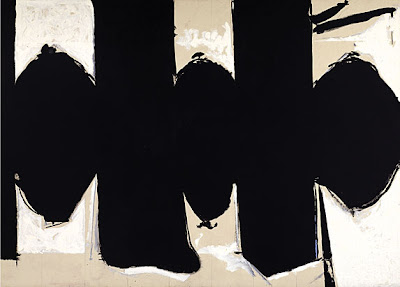
Robert Motherwell, Elegy to the Spanish Republic, No. 110, 1971, Oil and Plastic on Canvas
Robert Motherwell was an abstract expressionist painter very much associated with the New York School.
The execution of Spanish poet, Garcia Lorca, by the fascists in the Spanish Civil War of the thirties became a symbol of injustice. For artists, this embodied the modernist confrontation with established cultural values. Motherwell said, "the theme of an elegy is the insistence that a terrible death happened and should not be forgotton." Lorca's poem concerns a heroic bullfighter who is gorged in the ring. The three symbolic colors in the poem are red, the blood, the bleaching white light of the sun, and the blackness of death and shadows.
Motherwell's Elegy to the Spanish Republic is painted on a monumental scale honoring Lorca's death. This painting is the beginning of Motherwell's series paintings. He worked by composing the major forms and than later filling them in. Contours and drips were done at the end of the process and carry the most intense expressive content in the compositions.
The black horizontal lines punctuated with large black oblong forms are reminiscent to the castrated phallus of a bull. Bold brush strokes become symbols. A penis shape is overlapping on an inorganic shape. The color gets reduced and there is a bold black and white contrast much like the symbolic colors of Lorca's poem. Motherwell balances the forms quite nicely with three circular shapes flanking three horizontal black strokes. He fills in the countours of the black shapes with white paint symbolizing white blinding light.
Motherwell moves away from the themes of love in his Je T'aime series (1955), which are characterized by the french phrase "I Love You" written on every canvas. Motherwell had bouts of depression and by 1962 it was evident that his personal life was being painted on canvases. In the Elegy series, Motherwell mourns for the world and since the Spanish Civil War is known as the trial run for WWII, he expresses his sadness and grief for a post-WWII world.
Motherwell's greatest contribution to the history of art was conveying to the viewer the mental and physical engagement of the artist with the canvas.
--Peesh
No comments:
Post a Comment